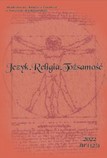Bezosobowość języka a bezstronność prawa w tekście prawnym. Analiza porównawcza markerów kategorii osoby i liczby czasownika w angielskojęzycznej wersji Powszechnej Deklaracji Praw Człowieka oraz jej przekładach na języki niemiecki, niderlandzki
The impersonality of language and the impartiality of law in a legal text. Comparative analysis of markers of the categories of verb: person and number in the English version of the Universal Declaration of Human Rights and its translations
Author(s): Patrycja MontusiewiczSubject(s): Human Rights and Humanitarian Law, Comparative Linguistics, Translation Studies, Stylistics
Published by: Akademia im. Jakuba z Paradyża
Keywords: grammatical categories of the verb:person and number; impersonality; legal text; comparative analysis;
Summary/Abstract: In her article, Patrycja Montusiewicz present the results of research on the phenomenon of correlation between the grammatical structure of a legal text and the linguistic message of its communicative intention. The study describe the grammatical categories of the verb: person and number. Montusiewicz, based on the examples excerpted from the source English version of the Universal Declaration of Human Rights and its translations into target languages German, Dutch and Polish target languages identifies the selection of an appropriate equivalent encoding the impersonality and impartiality of the analyzed declarative text. The results of the contrastive analysis has shown that the selection of specific grammatical markers depends on the internal specificity of a given language system and not on the formal, often matrix, similarity of the source and target language units.
Journal: Język. Religia. Tożsamość
- Issue Year: 25/2022
- Issue No: 1
- Page Range: 63-84
- Page Count: 22
- Language: Polish

